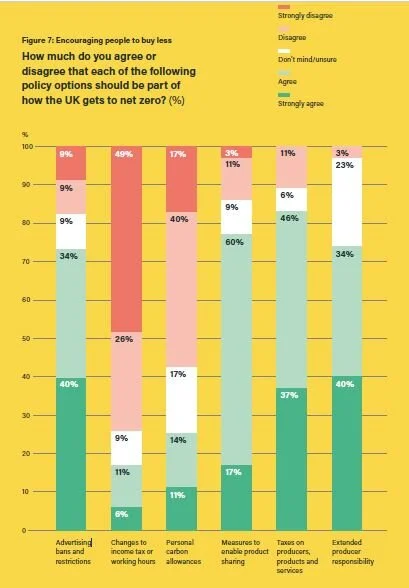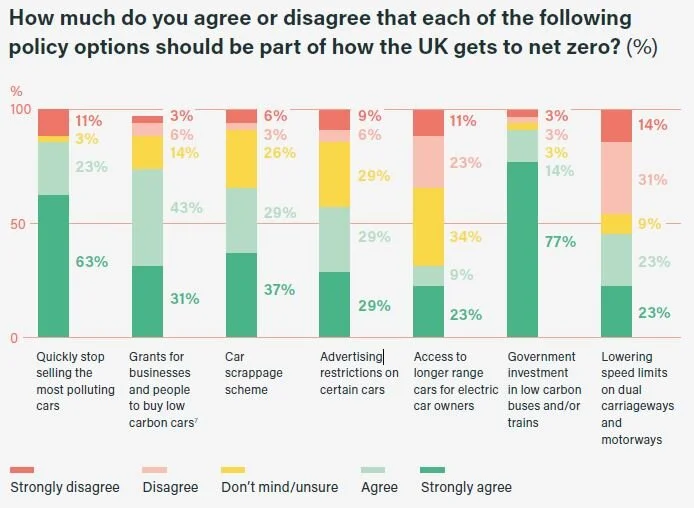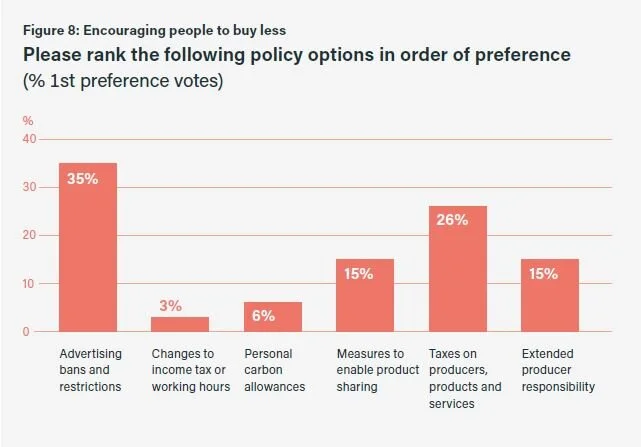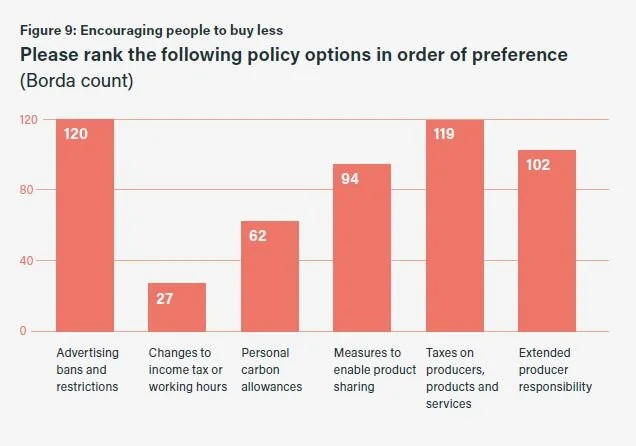UK Citizen’s Assembly puts advertising in the climate emergency spotlight
Reports, Andrew Simms.
Advertising pushes us to consume more. Advertising climate-damaging, high carbon lifestyles, with lots of driving and flying, pushes us to consume more of what is forcing the climate and ecological emergency.
Yet until now, the advertising industry itself has mostly escaped scrutiny. It’s one of the reasons the Badvertising campaign was launched. Now, the sector’s anonymity might be about to change quite suddenly, as the spotlight pivots to focus on it.
Perhaps unexpectedly, the new and very comprehensive report from the UK’s Citizens Assembly on meeting the official net zero carbon target by 2050, gives a lot of attention to the problem of advertising and makes a number of proposals for action.
This matters because the Citizens Assembly was instigated in the face of increasingly high profile climate emergency protests. And holding an Assembly has been a long-standing demand of the Extinction Rebellion campaign, even if the precise terms and conditions for this assembly were contested.
The Climate Assembly was the first UK-wide citizens' assembly, and was called for by six Parliamentary Select Committees (official groups of MP’s from different political parties) in the House of Commons, to find out the public preferences on how the UK should respond to the climate crisis. A number of 110 participants were selected via sortition – a type of random selection like in jury service (30,000 letters were sent via post) - who represent a balance of the UK population in terms of age, gender, education background, ethnicity, location and attitudes to climate change. The members met over a period of six weekends during the Spring of 2020, and discussed the evidence they were presented with on how the UK should meet its net zero target by 2050. Their recommendations were presented in a final report published on Thursday 10th September. So, what did the Assembly find on the subject of advertising? Quite a lot.
74%, back ‘advertising bans and restrictions’ on high emissions products or sectors
Source: Climate Assembly UK, The path to net zero
Perhaps most surprising for a subject that previously had been barely discussed in the context of climate breakdown, a big majority of those involved in the Assembly, a whopping 74%, backed ‘advertising bans and restrictions’ on products or sectors with high emissions .
Assembly members felt even more strongly – 92% of them in fact - that there was a need for ‘better information to promote informed choice and changes in individual behaviour.’
Make it illegal to advertise the most polluting cars
At its recent launch, the Badvertising campaign called for an immediate end to the advertising of big, polluting SUVs. We were delighted, therefore to read that, to help the UK shift to its net zero emissions target and to encourage a quick shift to low carbon vehicles, as well as saying that the most polluting cars should no longer be sold at all, Assembly members called for ‘advertising restrictions on certain cars’ to ‘make it illegal for car manufacturers to advertise their most polluting cars.’
All the Assembly’s recommendations were based on extensive discussion, and the final report gives some depth of the reasoning that led to them. Ending such advertising, they said, was “proven to work” and there was a widespread belief that advertising played an important role because “people are more likely to buy when they are advertised” and that advertising has “proven techniques to reach large populations.” Taking such a move would, they thought result in, “discouraging production of most polluting cars” and remove an “incentive to make more SUVs as demand should reduce.”
As a measure its benefits also included that there is “no cost to [the] tax payer” and that it is “very easy to implement tomorrow at low cost for a lowering of emissions,” and also didn’t directly have an impact on people’s options.
The measure was one of 15 proposals with majority support (58% supported this particular proposal), to help move quickly to ‘low carbon vehicles, increasing public and active transport, and discouraging car ownership and use.’
Source: Climate Assembly UK, The path to net zero
Regulate adverts for high-carbon food
Another area where bringing about change involved new rules for advertising, was food and especially ‘high carbon’ food. The Assembly proposed regulating adverts for high-carbon foods.
This meant both that adverts for food should be compelled to ‘include information about the relevant food’s emissions, or banning the adverts altogether.’ They also pointed out that there was a positive role for ‘healthy advertising’, ie, advertising positive low-carbon choices. One Assembly member commented, “Restricting high carbon advertising is great as it’ll be very effective.” One option also suggested was to tax advertising of high-carbon foods.
Escalating taxes for ‘high carbon’ adverts
Advertising also had a role to play where Assembly members looked at effective actions to increase the efficient use of resources. Among a range of taxes on producers, products and services, they proposed that these could include, ‘taxes on advertising that go up according to the carbon content of the product or service being advertised’ – or what is often referred to as an ‘escalating tax.’
Reduce advertising to encourage ‘buying less’
A further area where new checks and balances on advertising was proposed covered the issue of reducing over consumption – what the Assembly referred to simply as the challenge of ‘buying less.’
For this six policy options were proposed with bans or restrictions on advertising being one. Such measures would, argued the Assembly “stop polluting products or sectors, like fast fashion, being allowed to advertise” and that “advertising restrictions could limit advertising around towns or in other public spaces.”
Source: Climate Assembly UK, The path to net zero
Again, discussion among members elaborated on the reasons that they came to these conclusions. For example, it was felt that, “advertising has a large impact on consumption therefore this policy will have a large impact” and members liked the idea of “advertising restrictions to reduce consumerist behaviour.” It was felt too that the measure would be good in being able to, “can target [the] worst carbon offenders,” and also that it, “felt [the] most practical and implementable” or that it can “easily be done.” And, like the ban on adverts for smoking, it still, “retains consumer choice.”
Source: Climate Assembly UK, The path to net zero
The Assembly also discussed the conditions that might help make such policies to restrict advertising successful. While some favoured very broad bans on adverts, others preferred, “advertising restrictions or bans with [a] particular emphasis on junk foods, high sugar, fast fashion ” and “advertising for high carbon footprint products.”
There was agreement or strong agreement among clear majorities of assembly member for four policy measures to tackle over consumption with 83% in favour of taxes on producers, products and services, 77% in favour of enabling product sharing, and 74% in favour of both advertising bans and restrictions and extending producer responsibility.
In short, the Assembly’s Net Zero Report places a large, perhaps unprecedented focus for an officially sanctioned initiative, on the need to address the role of advertising across the economy. From transport to food and broader consumerism there was a strongly held view that advertising played a negative role in pushing ‘high carbon’ living, and that bans and restrictions should be used to help the UK meet its climate targets. It has thrust the advertising industry into the climate emergency sunlight and it will be hard for it to now shrink back into the shade.




